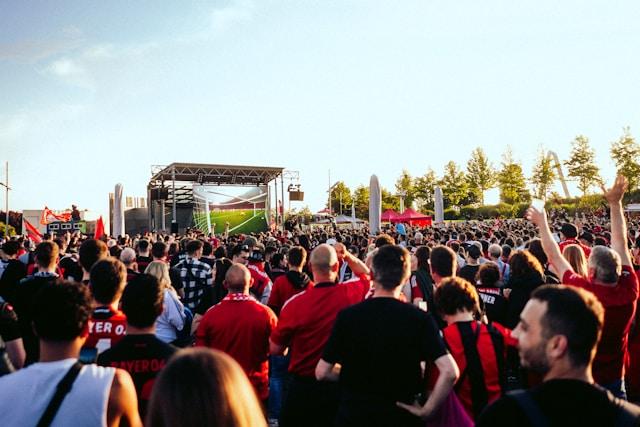The Psychology of Sponsorship: Why People Trust Brands that Support Events

When brands show up in the spaces people care about, they don’t just gain visibility - they earn trust through powerful, often unconscious psychological connections.
You've felt it before, that warm connection when you see your favorite team's jersey or notice a brand supporting the music festival you've been anticipating all year. It's not just recognition; it's something deeper. When brands show up in the spaces we care about, we don't just notice them - we start to trust them. But why does this psychological shift happen, and how can brands harness it authentically?
The answer lies in powerful psychological principles that transform simple logo placement into genuine consumer loyalty. Our data shows that when brands align with properties consumers already love, they tap into pre-existing emotional connections that traditional advertising simply cannot replicate. This isn't about visibility, it's about relevance, trust, and the unconscious ways our brains process brand associations.
The Challenge: Moving Beyond Logo Placement to Psychological Connection
Too many brands still approach sponsorship as a visibility play slapping logos on jerseys, stages, or venue walls and hoping for brand recall. This transactional mindset misses the profound psychological dynamics that make certain sponsorships incredibly effective while others fade into background noise.
When we analyze successful sponsorship campaigns, we consistently find that the most impactful partnerships understand consumer psychology first and build activation strategies around those insights. The brands that generate the strongest emotional responses aren't just present - they're meaningfully integrated into experiences that matter to their target audiences.
This psychological approach explains why Red Bull's gaming sponsorships achieve 79% aided sponsor awareness with 39% increased brand favorability, while countless other energy drink sponsorships struggle to move the needle. The difference isn't budget—it's understanding how human psychology responds to authentic brand alignment.
Sign up for the SponsorPulse Newsletter to get fresh, data-driven insights delivered to your inbox every month. ⬇️
Key Insights: The Three Psychological Pillars of Sponsorship Success
Our analysis reveals three fundamental psychological principles that transform sponsorship investments from marketing expenses into trust-building engines:
Association bias creates automatic emotional transfer. When brands support events, teams, and communities that people already love, the positive feelings consumers have about the property naturally extend to the sponsor. This isn't marketing manipulation - it's how human brains process connected experiences. Nike's tennis partnerships demonstrate this perfectly, with their strategic athlete relationships like Serena Williams creating lasting brand equity that extends far beyond individual tournaments.
Reciprocity drives subconscious brand loyalty. When consumers see brands supporting their favorite experiences, they feel an unconscious obligation to support those brands in return. This psychological principle explains why Red Bull's investment in grassroots gaming tournaments like Campus Clutch Valorant generates such strong purchase intent - fans appreciate the brand's commitment to their community and respond with loyalty.
Social identity alignment builds tribal connection. People don't just consume entertainment; they use it to express who they are. When brands authentically align with properties that reflect consumer values and identity, they become part of that person's self-concept. SponsorPulse data shows that properties like the US Open generate the highest engagement among Nike users, demonstrating how tournament partnerships reinforce brand identity among target demographics.
Strategic Application: How Psychology-Driven Brands Activate Differently
Consider how two brands might approach sports sponsorship using psychological insights versus traditional visibility strategies.
Traditional Approach: Generic Stadium Signage focuses on maximum impressions and brand recall metrics. The activation strategy emphasizes logo placement, assumes that visibility equals impact, and measures success through reach and frequency data.
Psychology-Driven Approach: Red Bull's Music Festival Strategy creates experiential activations like their signature Trailer Bars at festivals like Bonnaroo and Lollapalooza. These interactive spaces generate 74% aided sponsor awareness with 32% increased brand favorability because they understand that memorable experiences create stronger psychological connections than passive logo exposure.
Practical Application: Building Your Psychology-First Sponsorship Strategy
Smart brands are implementing three practical changes to leverage psychological principles in their sponsorship approach:
Map emotional connections before selecting properties. Instead of choosing partnerships based solely on audience demographics, investigate the emotional intensity and personal significance of different properties for your target consumers. The strongest sponsorships activate when brands support experiences that genuinely matter to their customers' lives and identity.
Design activations around reciprocity and participation. Move beyond passive brand exposure toward interactive experiences that demonstrate your commitment to the community. Nike's investment in emerging tennis talent and Red Bull's creation of original gaming content both generate stronger psychological responses than traditional advertising because they provide genuine value to fan communities.
Measure emotional impact alongside awareness metrics. Track brand favorability, purchase intent, and emotional connection data to understand whether your sponsorships are building the psychological bonds that drive long-term loyalty. Surface-level awareness metrics miss the deeper consumer relationships that create sustainable competitive advantages.
The Bottom Line: Psychology Transforms Sponsorship ROI
The most successful sponsorship partnerships understand that consumer psychology, not just consumer attention, drives business results. When brands authentically align with properties that matter to their target audiences, they access psychological shortcuts that traditional marketing cannot replicate.
Association bias, reciprocity, and social identity alignment aren't abstract concepts, they're measurable forces that transform logo placement into genuine brand loyalty. The data consistently shows that brands investing in psychology-driven sponsorship strategies achieve higher favorability, stronger purchase intent, and more sustainable competitive positioning.
This approach requires deeper consumer insights, more strategic property selection, and activation strategies built around human psychology rather than simple visibility. But for brands willing to move beyond traditional sponsorship thinking, the psychological advantages create lasting business value that compounds over time.


